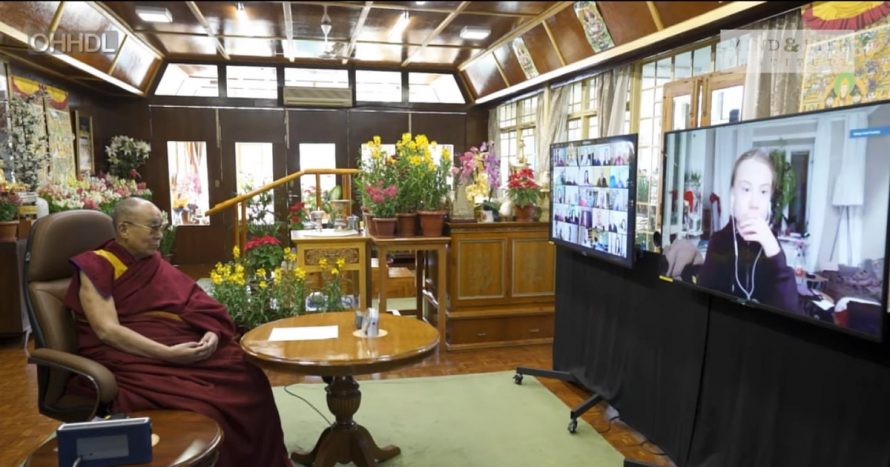They spoke across continents, cultures and generations, but united in purpose.
“Although we may be very different in terms of age span and many other things, we share the same goal,” Greta Thunberg told the Dalai Lama. “We share a common goal, and that is to protect our planet and life on Earth and humanity.”
The Swedish climate activist, 18, and the Tibetan Buddhist leader, 85, were unlikely but effective partners a few days ago at the Mind & Life Institute’s “A Conversation on the Crisis of Climate Feedback Loops,” which streamed live to millions of people around the globe.

The virtual conversation brought Thunberg and the Dalai Lama together with some of the world’s leading scientists.
Although the Dalai Lama had previously written Thunberg a letter of praise in 2019—she thanked him for it during the talk, saying his support “means a lot”—this was the first time the two renowned figures from dramatically different backgrounds spoke at the same event.
“When I heard about this young girl from Sweden,” the Dalai Lama said, “I really felt there is real hope from our younger generation.”
Feedback loops
The conversation focused on climate feedback loops, a less-discussed danger of the ongoing environmental crisis.
According to the Mind & Life Institute, which the Dalai Lama co-founded more than 30 years ago, “the effects of human-induced climate change have set into motion self-perpetuating feedback loops that are accelerating global warming.”
The event featured clips from “Climate Emergency: Feedback Loops,” a new educational film series narrated by International Campaign for Tibet Chairman Richard Gere.
“As the climate warms, forests, once removers of carbon, release it back into the atmosphere as carbon dioxide, or CO2,” Gere explains in one clip. “Frozen ground in the Northern Hemisphere thaws and emits CO2 and methane. These are the kinds of feedback loops that lead to further warming, triggering the release of even more heat-trapping gasses and raising the temperature even higher.”
Susan Natali, one of the scientists who took part in the event, described how climate change and feedback loops are endangering environments like Tibet, which is already warming nearly three times faster than the global average.
“The thawing of frozen ground called permafrost is dramatically altering the land in the Arctic and in other regions that contain permafrost, including the Tibetan plateau,” said Natali, who leads the Arctic Program at Woodwell Climate Research Center. “When permafrost thaws, it can cause the ground to collapse, damaging infrastructure, people’s homes, and creating hazardous conditions for the people who live on permafrost.”
Natali added that such thawing can affect the whole world because of permafrost feedback.
Dalai Lama’s environmentalism
The Dalai Lama said he has already seen the effects of a changing climate in Tibet and in Dharamsala, India, where he has lived for more than 60 years since China’s conquest of his homeland.
“In Tibet, in the Lhasa area [Tibet’s capital], when I was young, most of the high mountains [had] a lot of snow,” he said. “But gradually, year by year, less and less. And here in Dharamsala also, now the snowfall less and less.”
The Dalai Lama said scholars are warning that Tibet may someday become a desert. “So this is a serious matter,” he said.
He said he’s committed to preserving Tibet’s ecology. Already, he is one of the world’s best-known advocates for climate action.
In 1989, when the Dalai Lama received the Nobel Peace Prize, he became the first person to win the award in part because of efforts to protect the environment.
And at the start of this year, the Dalai Lama released a video titled “Our Only Home,” which calls for urgent action on climate change and promotes vegetarianism as one way to help heal the Earth.
The video ties in with the Dalai Lama’s new book, “Our Only Home: A Climate Appeal to the World,” co-authored with German environmental journalist Franz Alt.
Working together
During the event, Thunberg thanked the Dalai Lama for his activism.
“I can say as a younger generation, we appreciate that very much,” she said. “We are eternally grateful that you are standing up for us—not only for us, but for the future of the entire humanity and for the entire planet.”
Thunberg said she hoped their discussion would lead people to learn more about climate feedback loops and to organize for climate action.
“If I could ask one thing of you, it would be to educate yourself,” she said. “To try to learn as much as you possibly can—there’s an unlimited amount of information—and spread that knowledge, spread that awareness to others.
“We need to create a social movement,” she said. “We need to shift the social norm. Because if we are enough people who demand change and who are advocating for these things, then we reach a critical mass. And then we will no longer be possible to ignore.”
Diana Chapman Walsh, the president emerita of Wellesley College who moderated the discussion, said it was inspiring to see Thunberg and the Dalai Lama in tandem.
“We will all hold that image of the two of you together,” she said. “These two moral leaders and all that you represent, all the people behind you. We’ll hold that in our hearts as we go forward and take up this work together.”